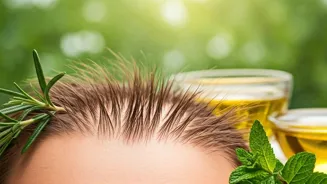Root of the Issue
Understanding the mechanics behind hair growth is the first step toward improving it. Hair growth relies on several factors, and recognizing these is crucial.
The growth cycle of hair involves three main phases: anagen (growth), catagen (transition), and telogen (resting). The anagen phase can last for years, while the catagen phase is relatively short. The telogen phase eventually leads to shedding, which is a normal part of the cycle. Numerous influences impact the health of your hair, including genetics, hormones, nutrition, and stress. Genetic factors largely determine the characteristics of your hair, such as thickness and growth rate. Hormonal imbalances, such as those experienced during pregnancy or menopause, can influence hair growth. A deficiency in essential nutrients like iron, zinc, and biotin can lead to hair thinning and loss. Chronic stress can also affect the hair growth cycle, leading to increased shedding. Furthermore, hair loss and thinning are influenced by a combination of internal and external factors. Thus, a holistic approach addressing both internal and external factors is vital for achieving optimal hair growth.
Diet and Nutrition
The foods you consume significantly impact your hair's health and growth. Incorporating a balanced diet rich in essential nutrients is vital. Protein is the building block of hair, so ensuring an adequate intake is crucial. Good sources of protein include lean meats, fish, eggs, and plant-based options like lentils and tofu. Iron deficiency is often linked to hair loss, hence consuming iron-rich foods like spinach, beans, and red meat is recommended. Zinc also plays a vital role, contributing to tissue growth and repair, and is found in foods such as oysters, nuts, and seeds. Omega-3 fatty acids, found in fatty fish like salmon, promote scalp health and can improve hair's appearance. Biotin, a B vitamin, is often marketed for hair growth and is found in eggs, nuts, and sweet potatoes. Moreover, drinking adequate water is also essential for hair health, as dehydration can make hair dry and brittle. Focusing on a diverse diet that incorporates these nutrients can provide the building blocks necessary for robust, healthy hair, reducing the likelihood of hair loss and fostering optimal growth.
Effective Hair Care
Besides diet, hair care practices play a significant role in influencing hair growth. Gentle handling of your hair is essential to prevent breakage. Avoid harsh brushing, especially when the hair is wet, as this is when it is most vulnerable. Using a wide-toothed comb is best for detangling, beginning from the ends and working your way up. Regular washing with a gentle shampoo can help keep the scalp clean and promote hair growth. However, washing too frequently can strip away natural oils, leading to dryness and damage. Choose shampoos that suit your hair type and avoid products containing harsh chemicals like sulfates and parabens. Conditioning after each wash is essential to hydrate and protect the hair shaft. Use a deep conditioner or hair mask once or twice a week for extra nourishment. Heat styling tools can damage hair, so limit their use. If you must use heat, apply a heat protectant beforehand. Additionally, certain hair treatments, like oiling, have been traditionally used to nourish the scalp. Massaging the scalp with oil, such as coconut or amla oil, can improve blood circulation and promote hair growth. However, when you use chemical treatments, be cautious of perms, relaxers, and coloring, as they can weaken hair. Using gentle methods and suitable products will foster healthier, stronger hair, aiding in the hair growth journey.
Lifestyle Adjustments
Certain lifestyle choices significantly affect hair growth. Managing stress is essential since chronic stress can disrupt the hair growth cycle, leading to hair shedding. Practice stress-reducing activities like yoga, meditation, or deep breathing exercises. Getting enough sleep is critical, as the body repairs and regenerates cells during sleep. Aim for 7–8 hours of quality sleep per night. Exposure to pollution and environmental toxins can damage hair. Protect your hair from these elements by wearing a hat or using protective hair products. Cigarette smoking has been linked to hair loss. Quitting smoking can improve overall health, including hair health. Regular exercise improves blood circulation, bringing nutrients to the hair follicles. Engage in moderate-intensity exercise most days of the week. Moreover, certain medications and medical conditions can affect hair growth. If you notice any changes in your hair, consult a doctor to address any underlying medical issues. Taking all these measures can improve hair health and foster hair growth, contributing to fuller, more vibrant hair.













